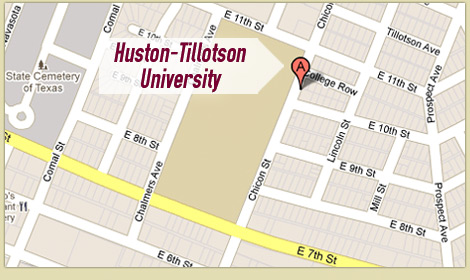
HT Among the Universities to Receive $50,000 STEM Grant
Friday May, 02 2014
Taken from the Penn Center release
The Penn Center for Minority Serving Institutions announces
Ten Historically Black Colleges and Universities Awarded STEM Capacity Building Grants
Through a $1.5 million grant from The Leona M. and Harry B. Helmsley Trust, the Penn Center for Minority Serving Institutions is awarding ten $50,000 grants to Historically Black Colleges and Universities to bolster STEM capacity. In addition, the ten HBCUs will participate in a three-year research project pertaining to STEM education, with the ultimate goal of improving STEM capacity among African Americans and other under-represented students.
Applicant institutions hailed from 12 different states and varied in institutional control (i.e. public vs. private), religious affiliation, and enrollment size. Moreover, they each presented several practices and programs that have improved students’ achievements in STEM. The selection process included several rounds of deliberation between the Co-Principal Investigators, as well as some members of the Penn Center for Minority Serving Institutions Advisory Board. First, applicants needed to demonstrate strong, empirical evidence that their practice or program had a substantial and positive influence on student achievement in STEM gateway courses. Second, applicants had to present a feasible and compelling project for the capacity building grant. The most innovative projects progressed to the final round. And third, the selection team took into account variation across the STEM disciplines.
HBCUs receiving $50,000 STEM capacity building grants include:
North Carolina Central University
Morgan State University
Huston-Tillotson University
Prairie View A&M University
Lincoln University
Dillard University
Delaware State University
Cheyney University
Claflin University
Xavier University of Louisiana
Marybeth Gasman, Professor in the Graduate School of Education at the University of Pennsylvania and Director of the Penn Center for Minority Serving Institutions (CMSI) serves as the Principal Investigator of this project. Thai-Huy Nguyen, research assistant at the Penn CMSI and Ph.D. student serves as the Co-Principal Investigator.
The Penn Center for Minority Serving Institutions brings together researchers and practitioners from across the spectrum of Minority Serving Institutions (MSIs) to harness the collective strengths of the these institutions and to solve the challenges they face. An integral part of American higher education, MSIs include Historically Black Colleges and Universities; Tribal Colleges and Universities; Hispanic Serving Institutions; and Asian American, Native American, Pacific Islander Serving Institutions. Among the Center’s goals are to elevate the educational contributions of MSIs, ensuring their participation in national conversations; to increase rigorous scholarship on MSIs; and to bolster the efforts of MSIs to close educational achievement gaps and assessment performance of disadvantaged communities. The Center for Minority Serving Institutions is located at the University of Pennsylvania under the direction of Professor Marybeth Gasman. #CenterforMSIs
The Helmsley Charitable Trust aspires to improve lives by supporting effective nonprofits in health, place-based initiatives, education and human services. Since 2008, when the Trust began its active grantmaking, it has committed more than $1 billion to a wide range of charitable organizations. Through its National Education Program, the Trust views education as a lever to advance both American economic competitiveness and individual social mobility. In K-12, the Trust focuses on ensuring all students graduate high school prepared for college or careers by supporting teacher effectiveness and the adoption and implementation of high academic standards. In postsecondary education, the Trust is primarily interested in increasing the number of Science, Technology, Engineering and Mathematics (STEM) graduates who can participate in high growth sectors of the economy. The Trust also focuses on policy levers that improve postsecondary completion, particularly for underrepresented populations.





